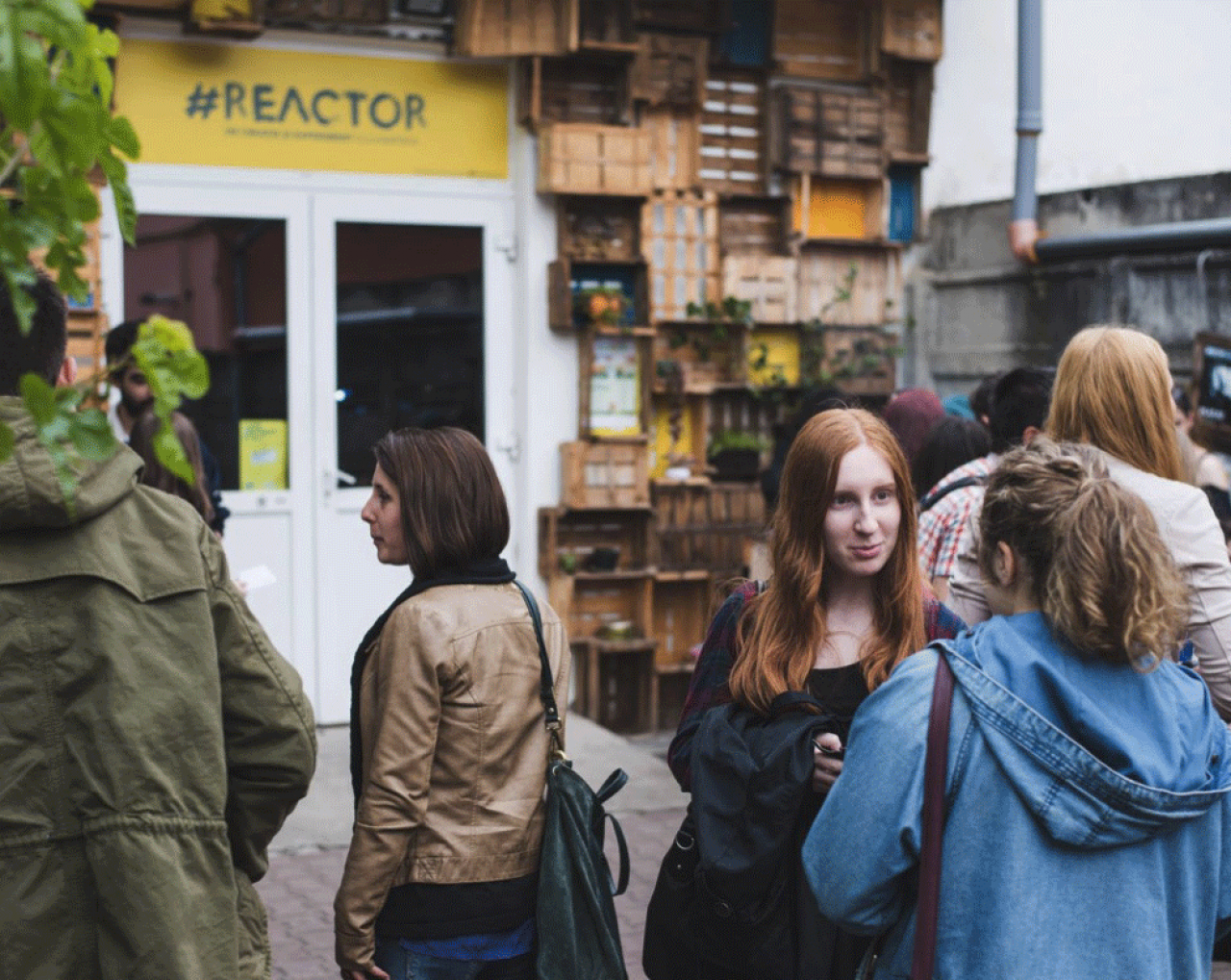
The REFILL project is all about the reuse of vacant spaces. A key question is how these spaces are filled to best use. This article describes the speed dating process between city authority departments and bottom-up initiatives which are candidates for the temporary use of urban vacant spaces.
The challenges of Zaklad Markerspace in Poznan
Zaklad is a Makerspace hosted for a temporary period in a disused former printing company in the centre of Poznan. "We wanted a place to do stuff open to everybody so we got this spacefor temporary use, we brought machines and here it is: there is an incredible energy here!" says Zofia one of the Zaklad 4 founders.
Yes but what is really a makerspace and what does it mean for the neighbourhood around? These forms of open and collective workshops are popping-up in cities all over the world. Like many such social innovations, they show evidence of strong assets in terms of social empowerment (attracting unemployed youth, fostering collective projects), capacity-building (teaching skills, triggering economical activities), sustainable lifestyles (recuperating wasted material, teaching maintenance and repair of goods), etc. As an innovation in progress, it is promising, fresh, but not always very clear and often a bit clunky.
Their promoters themselves have a fuzzy idea of what could be the rationale and the arguments when seeking support from social entrepreneurship business angels or public authorities. They show a strong potential but at the same time they present huge difficulties to express and realise it. As Amalia Zepou, new Vice Mayor for Civil Society and Innovation in Athens and participating at the REFILL kick-off in Poznan said: "They struggle in paying the required rent for the space they occupy and often lack arguments to show the indirect benefit of their activities that is likely to justify access to public supports such as temporary use schemes, preferential rent, prolonged stay, etc."
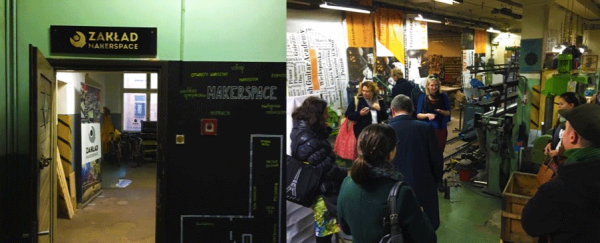
Photo by Strategic Design Scenarios
Lack of contacts between city administration and local initiatives
The REFILL URBACT network is focussing on the temporary use and accommodation of all these emerging social, cultural or business gems so that they could blossom, synergize and fully express their multi-facetted benefits to help transform the city.
Temporary use initiatives sometimes have difficulties to connect with the different departments of the city administration. They often don't express their intentions and projects in a readable way to match the city policy priorities or to tap into the different municipality departments' agendas.
Reciprocally, the city administration tends to look at temporary use initiatives through their own grids of structural organisation and policy orientations. They tend then to miss opportunities to liaise with social innovation's dynamics and fail to build win-win cooperation with citizens.
Designing a meeting process between city administration departments and candidates for temporary use
Cases like Zaklad Makerspace raised in REFILL the idea of organizing a 'matchmaking process' between such promising grassroots initiatives and city administration. This matchmaking process should take the form of a co-construction workshop where different social and cultural initiatives could sit together with different departments of the municipality and investigate possible collaborations. The aim of the matchmaking would be to look for synergies on burning problems such as social inclusions, youth employment, sustainable education, etc. or invent partnerships on common cultural interests, environmental progresses, economic development, and so on. between candidates for temporary use and city authority departments.
But are we dreaming here or can we really do it? And in particular can we do it in the framework of an URBACT Action Planning Network? As Zofia from Zaklad would have surely said: "let's make it and we'll discuss after if it was possible or not!"
We co-created the basic steps of the Match-Makers process taking inspiration from the different REFILL partner cities and combining inputs from their positive and negative experiences.
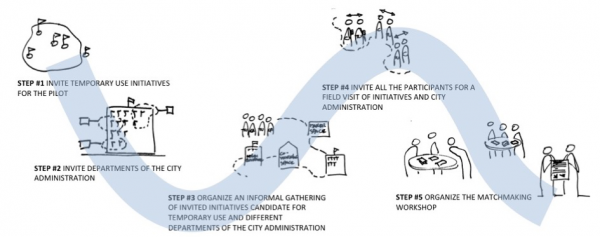
Scheme by REFILL consortium
Brokering between city departments and local initiatives in Ghent
The city administration hardly knows the many initiative of social innovation in the city and all these initiatives hardly know each other. We need then to bring all these stakeholders into the same room to let them familiarize and discover each other. The city of Ghent is accustomed to organize such gathering as they recently did with the Bibmarkt: 147 bottom-up initiatives and more than 300 participants gathering for one evening to liaise with each other, find affinities and build consortia to pitch for 8 months of temporary use in the former city central library.
This was an incredible successful marketplace of social innovation organized by the Policy Participation Service together with the different departments of the city administration and policy makers. The REFILL Match-Makers process has built on this idea of the city playing the role of a broker bringing all the stakeholders together proposing a matching process. But they also followed the advice of the intiatives to then let it go and leave it to them to find mates and organize partnerships.
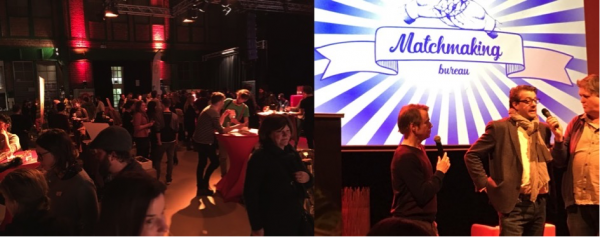
Photo by Strategic Design Scenarios
Simulating public private people partnership in Amersfoort
Stakeholders' gatherings, participation processes, citizens' forums and such like are more and more common within city governance. They generally aim at hearing all stakeholders’ voices and firing a lot of new ideas whereas the challenge is not so much to get new ideas but to go beyond idea generation and tackle implementation issues. Inspired from the matchmaking events the ngo Matchpoint organises every year between local companies in Amersfoort and local ngo’s the city of Amersfoort organized Stad Zoekt Boer, City meets farmer an matching process between all actors at stake with sustainable food in the city and around in 2007 and 2008.
Here again an average of 400 participants were involved in a speed dating event. And this is where the method is inspiring: all day parties were dating for short slots with the scope of exploring possible collaborations between each other enough to draft an imaginary contract signed between parties. About 140 such fake contracts were signed in one day: enough intentions of collaboration to outline a vision of sustainable food for the city and concrete enough that about a fifth of them evolved into real contracts after a couple of months. Here also this experience is very inspiring for the REFILL Match-Makers process showing that departments of the city administration and bottom-up initiative should not only meet but expect concrete collaborations to start right-away.
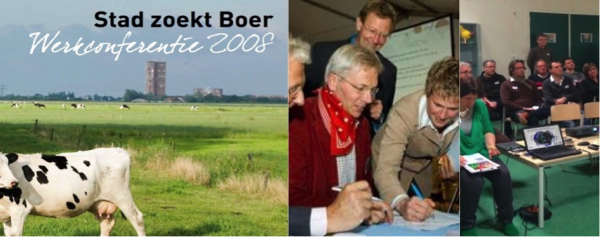
Photo by City of Amersfoort
A REFILL Match-Makers pilot in Cluj
Starting from these inputs and from the experience of the network's partner cities we drafted a REFILL Match-Makers process and loyal to our principle of "doing before thinking" or at least of "putting the reality into project to better investigate it", the city of Cluj-Napoca volunteered to organise a pilot over summer 2016. Key steps of the REFILL Match-Makers process in Cluj were:
On-site and out of comfort zone
The REFILL Match-Makers process started with on-site visits involving civil servants out of the comfort zone of the city administration. The intention is to see initiatives in their own contexts and not only through the applications they submit to answer city's calls.
The tour of initiatives in Cluj allowed city departments to visit Fabrica de Pensule a former paintbrush factory temporarily hosting more than 70 art studios and 7 art galleries; Reactor contemporary arts, theatre, craft workshops temporary center; Somes delivery temporary installations along the Somes river; etc. all brilliant initiatives hosted in different forms of temporary use that civil servants generally already knew on paper but not in real life. It allowed also the initiatives themselves to take part in the tour and discover and liaise with each other.
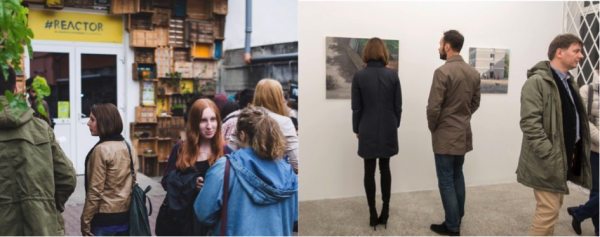
Photo by City of Cluj
Inviting players to share their agenda
Both bottom-up initiatives and departments of the city administration were considered as separate parties at stake sharing their intention with one slide picturing who they are and why they want to take part. If Pecha-Kucha-like speed presentations is common ground for social, cultural or business initiatives, it is far less common to see public administration departments presenting themselves with one large picture and a claims such as the "improve the touristic offer with quality projects"; "increase the city collaboration with informal initiatives"; "act as ambassadors in order to link initiatives and private investors" or "better accommodate bottom-up initiatives through the development of temporary use in Cluj"; etc.
Building one-to-one scenarios of collaboration
The last step of the REFILL Match-Makers process consisted in building scenarios of collaboration. Cluj stakeholders engaged so far sat together in one-to-one configurations. Speed dating setting allows going beyond generic discussions generally leading to nowhere. They focused on what a specific initiative and a specific city department could do together.
Eight scenarios emerged such as the Somes delivery urban experimentation and the Office of traffic safety and public roads agreeing user-centered temporary interventions to increase pedestrian usability of urban spaces; Scena Urbana and the Department of Tourism and Community Affairs collaborating on making the historical Central Cemetery a venue of interest for foreigners; Reactor art platform and the same Department of Tourism and Community Affairs co-organizing shows investing a series of unused/abandoned and including them in the touristic circuit; Urbanect activists and the Department of Cultural Projects using Urban Living room domestic installations reclaiming public space to help revitalize the city and enhance simple direct communication between local administration and civil society; etc.
"We thought we knew what the initiatives wanted but in the end we realised we did not, we just did not know them. We all realized that simple discussion and imagining ideal situations where we could help each other brought a lot more than we thought they could. We strongly believed that this will the beginning of some real collaborations" say Calin Forna, the Director of the Events Planning Department of the city of Cluj and ULG-coordinator for REFILL. All that took place at the Cluj Makerspace, echoing where the all process was ideated in Poznan.
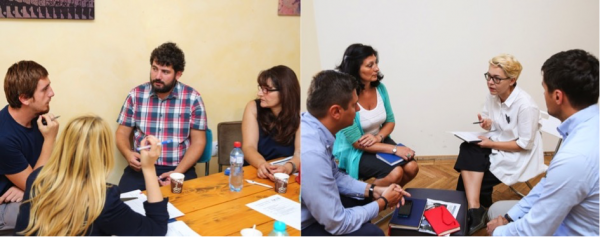
Photo by City of Cluj
Closing the loop with a REFILL Match-Makers process in Poznan
Last but not least, in the meantime Zaklad Makerspace in Poznan where the initial idea of the REFILL Match-Makers process emerged had to leave its temporary use location. The space of the printing company where they were hosted has been sold and Zaklad urgently needed to find a new place to settle in the city.
The Project Coordination and Urban Regeneration Office in Poznan City Hall prepared a Match-Makers process adapting the REFILL scheme to the situation. The Match-Makers process was presented to Zaklad Makerspace. Zaklad's organizing team found it interesting in the perspective of their future activities. In parallel the Match-Makers process was also presented to different departments of the city administration both rising informally interest among colleagues from cooperating departments and sending official invitations.
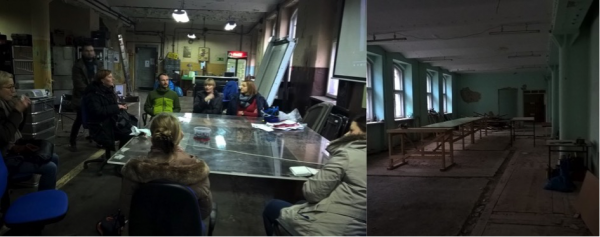
Photo by City of Poznan
An old paper mill building in Poznan's “Old Town” district was foreseen to host Zaklad Makerspace and a field visit was organised there. The same day one-to-one meetings took place between Zaklad organizers and representatives of different parts of Poznan city administration: Department of Education, Department of Culture, Promotion Unit of Mayor’s Cabinet and experts for infrastructural, social and educational European projects as well as for urban regeneration from Project Coordination and Urban Regeneration Office. Every hour, starting from midday the different departments came and discussed new perspectives of collaboration. "All the day was organized in a cosy neutral place outside the City Hall around a cup of coffee, say Natalia Madajczyk and Agnieszka Osipiuk from Project Coordination and Urban Regeneration Office in Poznan and REFILL local coordinators, short talks from invited guests and a presentation of inspiring temporary use examples from URBACT REFILL partner cities worked well to facilitate the conversations".
In particular, a great match emerged between Zaklad and the Department of Education outlining possible actions directed to students, participation in the events organised by the City, special programmes of entrepreneurship for schools. Most of them can be started right away while Zaklad Makerspace makes use of a new temporary use period in the old paper mill building.
From the REFILL kick-off meeting in Poznan in October 2015 until November 2016 we have closed the loop: the REFILL Match-Makers process has been ideated, co-designed with the collaboration of REFILL city partners, piloted by some of them and is back in Poznan and to the very Zaklad Makerspace where it started: a good way to use the collective energy of URBACT Action Planning networks to invent, design and experiment with new tools and processes towards a more collaborative, integrated and fluid city administration!
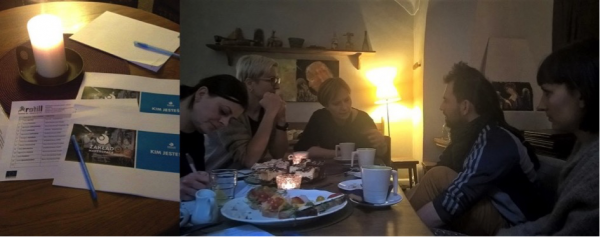
Photo by City of Poznan
François Jégou, Strategic Design Scenarios & LE REFILL

